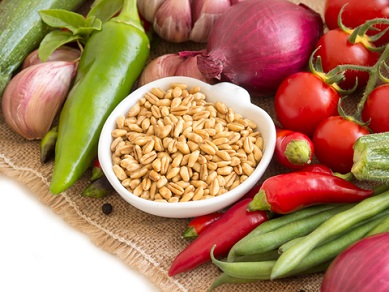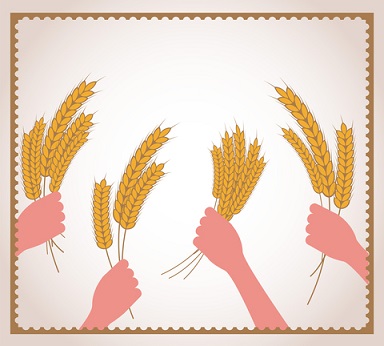
People who ignore science would have you believe that, although the veggies in this picture are healthy, the whole grains in their midst are not. Research shows conclusively that the whole grains are excellent foods as well, and have a long list of well-known health benefits
Whole Grains Are Healthy -And That Includes Whole Grain Bread
Whole grains have an image problem. Pervasive media stories and nutrition books warn that eating grains puts you at risk for obesity and chronic illness. When you look at the facts, however, whole grains are clearly health-promoting in numerous ways you can use to your advantage.
The choice becomes clearer once you understand what these foods are. Whole grains are the seeds of certain grasses that store their energy mostly as complex carbohydrates. Wheat, corn, rice, barley, oats, millet, and rye are the most common examples.
Whole grain foods contain all parts of the seed. These include the outer protective skin (bran), tiny baby plant (the germ), and food to nourish the baby plant until it can produce its own (endosperm). Refined grain foods are generally made only from the endosperm.
Quinoa, buckwheat, wild rice, and amaranth are seeds that are examples of “pseudo-grains.” These are similar nutritionally to traditional whole grains, but are produced by plants that are not grasses. While this difference is important to botanists, if you are simply trying to decide what to cook for dinner, you can use whole grains and

Whole grains have been prized as food for at least thousands of years. Their wild seed ancestors were undoubtedly eaten as well
“pseudo-grains” interchangeably.
Published, peer-reviewed science on people who eat more whole grains substantiates a spectrum of health benefits for these foods.
WHOLE GRAINS LOWER THE RISK OF OBESITY
A common myth is that foods high in carbohydrates, such as whole grains, encourage obesity. Yet the truth is quite the opposite in considering actual studies of people who consume more whole grains. Here are some representative findings.
• A U.S. study of men found that, over eight years, those who ate more whole grains gained less weight. In fact, each additional 1.4 ounces of whole grains eaten per day staved off a pound of weight gain. Similarly, a study of women in the U.S. over twelve years discovered the women who consumed more whole grains consistently weighed less than others
• A study in Norway found higher central obesity (think “belly fat”) in those who ate the least whole grain bread
• An analysis of 15 research trials with data from 119,829 participants concluded that a higher intake of whole grains was linked to lower BMI and waist size
WHOLE GRAINS LOWER THE RISK OF CHRONIC ILLNESS
People who consume whole grains have less chance of developing the chronic illnesses that pervade the modern world. In fact, eating more whole grains is linked to lower levels of a common inflammatory marker associated with chronic disease. Consider a few of the many consistent results.
• While diabetes is popularly thought to be associated with high carbohydrate foods,
an analysis of 16 studies found that 3 whole grain servings a day reduced the risk of developing diabetes by 32%
• Another analysis of 66 studies on whole grains found a similar number – a 26% decrease in the risk of developing diabetes, as well as a 21% lower risk of cardiovascular disease with higher whole grain consumption. Specific risk markers improved by these foods included fasting glucose, insulin, cholesterol, and blood pressure
• A Scandinavian study of 108,000 participants discovered eating more whole grain products lowered the risk of developing colorectal cancer, with whole wheat having the strongest benefit
WHOLE GRAINS HELP YOU LIVE LONGER
In 2015, researchers published an analysis of two large studies of participants followed for a period of about 25 years. They reported each additional one ounce daily serving of whole grains lowered the risk of death over the study period by 5%, and of death from cardiovascular disease by 9%. The beneficial effect was seen from the combined effects of many foods, including whole wheat and whole wheat flour, oats, corn and popcorn, rye, brown rice, and whole grain breakfast cereals.
Scientists cite a number of reasons that whole grains could have such favorable effects. Their high fiber makes these foods more satisfying, and whole grains promote beneficial gut microbes which produce protective short chain fatty acids. These foods are dense with vitamins, minerals, amino acids, antioxidants, and phytochemicals. Whole grains may also displace less healthy foods that would otherwise be eaten. The big picture, as it is better understood, is likely to involve numerous, interrelated reasons why whole grains are health-promoting.
Don’t let unsupported claims by those who ignore the consistent science deprive you of the pleasure and benefits of whole grains. These foods are inexpensive, filling, nutritious, and healthful. Enjoy them throughout your day.
If you enjoyed this post, you may want to check out this suggestion for green sandwiches as a way to achieve a satisfying, simple combo of whole grains and veggies.
Intrigued? Now you can use our Whole Foods Blog Finder to target informative, fun postings on whole foods, plant-based diets. Quick information at no cost!
Blog posting written by Janice Stanger, Ph.D. Janice authored The Perfect Formula Diet: How to Lose Weight and Get Healthy Now With Six Kinds of Whole Foods. This book shows you why a whole foods, plant-based diet, including whole grains, will get you to your ideal weight permanently. This article was previously posted on the Forks Over Knives site under a different title.
Tags: longevity, whole foods plant-based diet, whole grains, whole wheat







